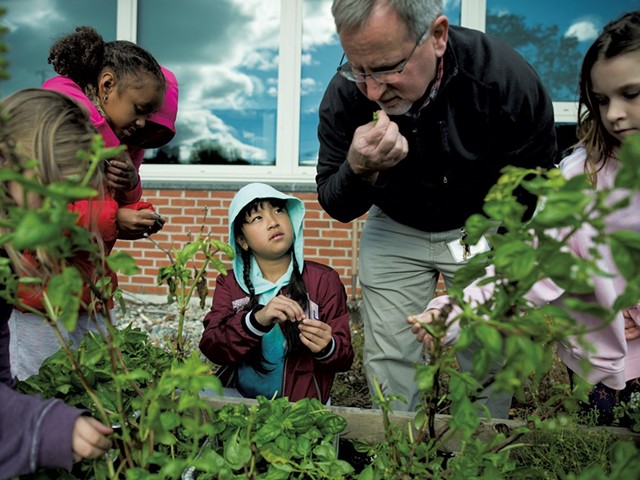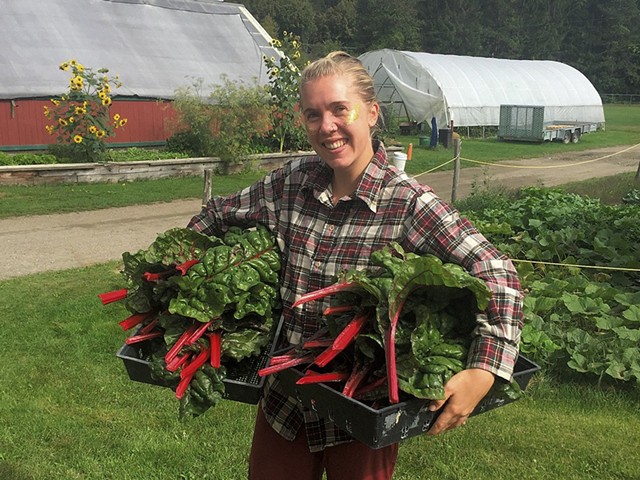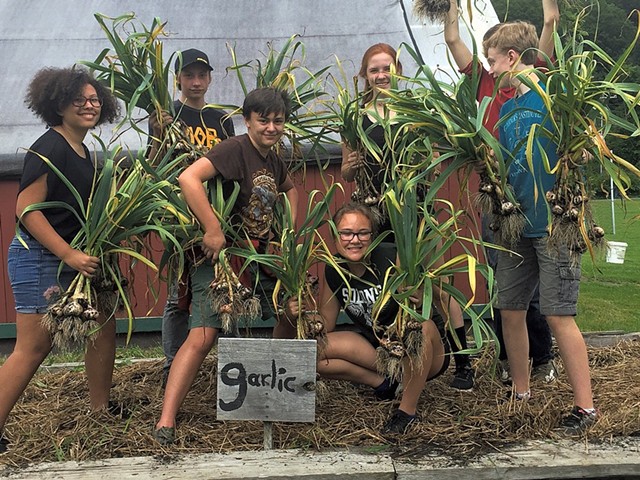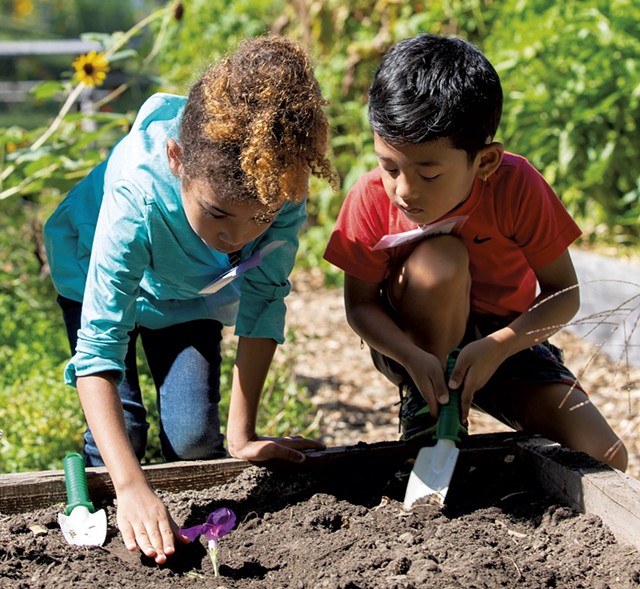
- Courtesy of Andy Duback
- Burlington students explore their school garden
The other day, a Front Porch Forum post caught my attention:
"The Berlin Elementary School is looking for an individual or family to volunteer to manage the Anne Burke Community Garden, particularly in the summer, in exchange for produce. For the past eight years, the students at school have grown and harvested vegetables and maintained the garden as a Farm-to-School initiative. However, we realize that in the summer, it has been a challenge to water, weed, and harvest in a timely manner. There are 15 raised beds and a hoop house. A shed houses all the tools that would be needed — trowels, clippers, shovels, wheelbarrows, etc."
Brilliant! I thought. What a fine way to hook up folks who want to grow a garden with the space and resources to do so.
A big part of establishing a sustainable local food system is getting the next generation of growers, gardeners and consumers interested in healthy, homegrown food. The Vermont Farm to School Network is a statewide coalition of nonprofits, schools and farmers with ambitious aims: bringing nutritious food to young people, educating youth on how their food is grown and cooked, and encouraging school cafeterias to support the Vermont economy. According to the most recent U.S. Department of Agriculture Farm to School Census in 2015, 83 percent of Vermont school districts had a farm-to-school program, and 6 percent more were in the planning stages — the highest percentage in the country. A significant piece of this work is the construction and maintenance of school gardens, as well as the development of curricula that integrate real-life, hands-in-the-dirt learning.

- Courtesy of Tom Sabo
- A Montpelier High School student harvesting Swiss chard for the cafeteria
A school garden can be as simple as a couple of raised beds with flowers, herbs and vegetables. It might be thematic, such as a Three Sisters Garden, in which students can learn about how important corn, beans and squash are to many Native American people and, in the process, discover the scientific purpose of companion planting. Or it can be as extensive as that of the Barnet School in the 1990s, where my National Science Foundation-funded research on integrated curricula took me. There, gardens were at the center of the K-8 curriculum, supplemented by stations throughout the 95 acres of wilderness land where students studied birds, weather, geography, water systems and astronomy.
One of my favorite local initiatives is the Tea Project for educators, run by Angie Barger of Luna Root Wellness in Marshfield. Teachers who go through the program learn to create classroom communities in which elementary school kids grow and harvest herbs, learn to make healing salves, and drink tea together each day. The children develop not just the science skills of observation, classification and prediction, but important dispositions such as self-care, body awareness, empathy and mindfulness.
I spoke with Food Works founder Joseph Kiefer, coauthor of Digging Deeper: Integrating Youth Gardens Into Schools & Communities, to learn more about the history of school gardens in Vermont. Kiefer was instrumental in the 1980s movement to establish gardens and gardening curricula in Vermont schools. He reminded me that school gardens have a long history in the state, dating back to the 1800s, when agriculture was an essential part of the preparation of teachers, and continuing through World War I, when 30,000 schoolchildren raised 200,000 pounds of potatoes and beans to support the war effort. The COVID-19 crisis and the rush on garden seeds reminded many of us of the victory gardens of World War II, when much of the population was called upon to ensure a viable food supply at home and abroad.

- Courtesy of Tom Sabo
- Food, Farm, and Society students celebrate the garlic harvest in Montpelier
But the Vermont school year ends in late June and starts up again in September. As every gardener in Vermont knows, our season ranges from May through (if we're lucky) October. That Front Porch Forum post got me wondering: What happens to all these lovely school gardens in the most bountiful months of the summer, when school is out and there is no one to tend them?
I brought my question to the experts: Libby Weiland of the Vermont Community Garden Network, Betsy Rosenbluth of Vermont FEED and Jen Cirillo of Shelburne Farms. All three are involved in the Vermont Farm to School initiative, and all are passionate about the learning that can happen when a school decides to "go green" and start a gardening program. They tout the many benefits of school gardens: Children eat more veggies and participate in more outdoor activity, and they learn not just about gardening but about related topics like hunger, food equity and how regenerative farming can help mitigate climate disruptions.
I asked them that pesky question: What happens to these wonderful gardens in the summer? Weiland pointed out that there is no simple answer but that each school needs to take a step back and ask questions like, Why do we want a school garden? What are our long-term purposes? What does it mean to the community? All of the experts emphasized the importance of cultivating community partnerships for success. And they agreed on the importance of good stewardship: Who will shepherd this project through the issues and challenges that will come up? Addressing these more substantial questions will lead to a plan for tending the lonely summer garden.
When Kiefer first began his garden projects in Vermont schools, Food Works itself did a lot of care and maintenance of the gardens. That is one expensive solution — bringing in professionals to nurture the land through the summer. At other schools, parents would rotate through the summer months, signing up for weeding, watering and harvesting, and keeping a journal with photographs of the garden's progress.
Now, smartphones and computers have replaced paper journals, making communication with the school community instantaneous. But parent volunteers and families still play a large part in maintaining gardens. Some schools are beginning to get creative with their budgets, hiring year-round specialists to advance this important work. Summer school programs are encouraged to utilize the gardens in their curriculum. And, surely, we could find the resources to employ young people looking for summer jobs who don't mind getting their hands dirty!

- Courtesy of Sarah Webb for Vermont FEED
- Kids tend a school garden in Burlington
Montpelier High School has found innovative ways to make its programs self-sustaining. Tom Sabo is a biology and life science teacher at MHS who has made sustainability the centerpiece of his science program. Thanks largely to Sabo's efforts, the school grounds now boast two solar-powered greenhouses where students grow salad greens for the school cafeteria, two beehives, an earthen oven, a chicken coop and flourishing summer gardens that supply food to those who need it.
A partnership with the Vermont Compost Company means the school's food waste is processed into rich soil for the gardens. On hold during the pandemic but starting up again this spring is an innovative aquaponics system in which students raise tilapia in a 100-gallon tank, then cycle the wastewater through a gravel bed that nourishes a variety of plants, including cherry tomatoes and cucumbers. The water is then cleaned and returned to the fish tank via a solar-powered sump pump. According to Sabo, this model demonstrates the idea that "there is no such thing as waste in nature."
Sabo has no trouble finding young people to tend the summer garden projects. Students can earn graduation credits studying history, psychology, economics and sociology, all in the context of tending the gardens, making salsa and other products in student-run businesses, and partnering with community organizations to serve those in need. An extra perk? Students in Sabo's Food, Farm, and Society summer program get to enjoy fish tacos!
Visitors from all over the U.S. and beyond come to Vermont to study the innovative ways we are developing sustainability programs in our schools. We have a lot to be proud of, but there is a lot more we can do. When a community gets involved in the school garden, the school has the potential to become the center of community life.
The pandemic has shown us that our food supply chains are not as dependable as we once thought. Our eyes are opened to the many unmet needs in our communities, including food insecurity. We are learning that our communities are not as welcoming as they should be to newcomers and people of all cultural backgrounds. With heart and vision, the community school garden can become a hub of connectivity and resilience, teaching all of us what is necessary to build strong, healthy and sustainable communities.










Comments
Comments are closed.
From 2014-2020, Seven Days allowed readers to comment on all stories posted on our website. While we've appreciated the suggestions and insights, right now Seven Days is prioritizing our core mission — producing high-quality, responsible local journalism — over moderating online debates between readers.
To criticize, correct or praise our reporting, please send us a letter to the editor or send us a tip. We’ll check it out and report the results.
Online comments may return when we have better tech tools for managing them. Thanks for reading.